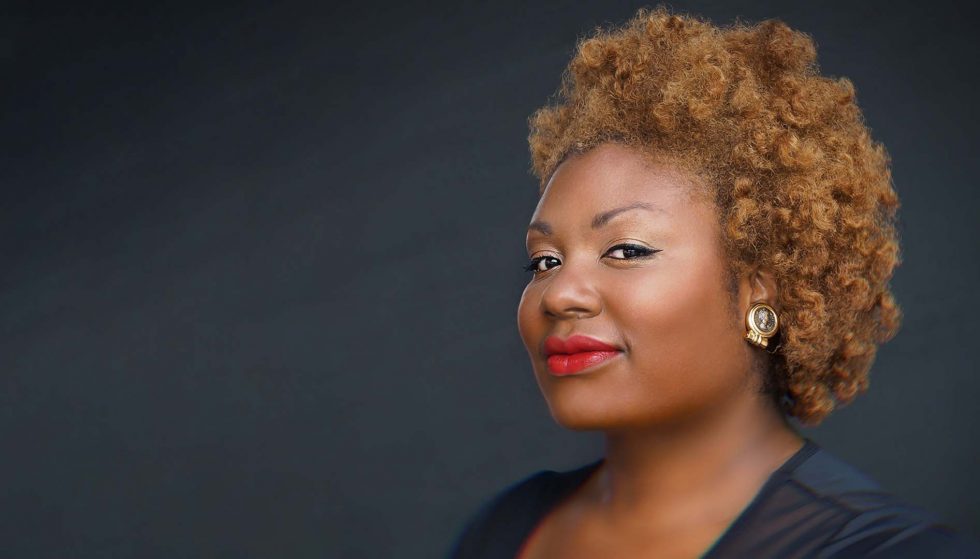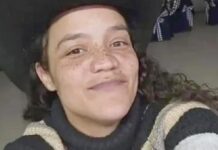
*Award-winning mezzo-soprano Raehann Bryce-Davis has been hailed for performances on recital stages and in opera houses around the world.
With live theatrical performances put on hold due to the global COVID-19 pandemic, Bryce-Davis found her career at a standstill while the country faces a major health crisis as well as racial turmoil.
To inspire viewers during this uniquely somber time, the artist has recorded her performance of composer Gaetano Donizetti’s aria, “All’afflitto e dolce pianto” (“To the afflicted”). The beautiful new video, featuring Bryce-Davis’ gorgeously full-bodied voice along with news headlines, photos, and personal videos, was co-directed by Bryce-Davis and independent filmmaker Jon Goff. The video can be viewed on YouTube here, with Bryce-Davis’ introduction video here.
IN NEW PODCAST… Michelle Obama Confesses She Wanted to ‘Push Barack Out of the Window!’ / LISTEN
Raehann Bryce-Davis Introduction Video
Music Video
Bryce-Davis says she was inspired to shoot the video to reflect the emotional and professional struggles of people of color, particularly those in the arts, during the pandemic. The talented vocal star had only just debuted as Sara in the Los Angeles Opera’s production of Donizetti’s bel canto masterpiece, “Roberto Devereux,” when the coronavirus forced the production to shut down in March. Bryce-Davis felt that the Act I Scene I aria sung by her character, in which she mourns for her lover who is far away, is a perfect expression of solidarity with those who mourn for the arts and justice, which feel so far away.
The first lines of “All’afflitto e dolce pianto” in English translate to: “To the afflicted, weeping is sweet, it is the only joy which remains.” With so many people currently afflicted by the social climate, the lyrics remind us that it is OK to mourn and hold each other up. It also shows how operatic works written centuries earlier can still be relevant today.
“The two biggest things that I wanted to convey were, A) You’re not alone. We’re all going through this together,” explains Bryce-Davis. “And then, B) It’s everybody’s fight. It’s not just someone’s problem in Kenosha. It’s not just somebody’s problem in Florida. It’s all of our responsibility to take up the fight, do the work to fight racism, and fight daily for equity and justice. I am dedicating the video to people in opera and other art forms who are suddenly afloat and to those who are fighting on the front lines for equity and justice.”
Bryce-Davis’ video also directs viewers’ attention to two organizations to support the arts: The Black Opera Alliance, founded in June 2020 to help provide professional resources for struggling opera singers as well as create equity within the field; and Arts Unlimited Southwest, a nonprofit community arts center founded by her mother, Hortensia Bryce, that provides musical training for kids of all ages, many of whom do not have access to classical instruction.
The idea for the video first came to Bryce-Davis in April, soon after social distancing measures became widespread. With a limited budget and resources, the vocalist was able to engage several people in her vision to create the final production. These include pianist Esme Wong, director of photography Jon Goff; audio engineer George Miadis; Harold James, a Marc Jacobs European Ambassador; and Allan Virgo, a New York fashion designer. The stunning styling included makeup by Natalie at South Beach Beauty Bar and hair by Stephanie at Lovely R “U” Beauty Salon. She even negotiated a deal through Airbnb to shoot the project at a beautiful hilltop castle on 22 acres in which to set her live performance.
Born to Jamaican immigrant parents in Mexico who eventually settled in Keene, Texas, Bryce-Davis did not plan to become an opera singer. In college as a business major, she began taking voice lessons at the University of Texas-Arlington. Her instructor urged her to further develop her beautiful voice, and she soon switched her major to music. She then went directly to New York City, earning graduate degrees at the Manhattan School of Music. Inspired by such opera divas such as Grace Bumbry and the late Shirley Verrett, Bryce-Davis then launched her international career.
The rising mezzo star had her debut at Carnegie Hall in 2018 and has been invited to return every season since her debut. She is a winner of international competitions across the world including New York City; Vienna, Austria; Portofino, Italy; Capetown, South Africa; and Istanbul, Turkey. She has appeared in numerous operas in the U.S. and abroad. Her more recent performances include opening the 2019/20 season singing Verdi’s “Requiem” with conductor Kent Nagano and the Orchestre Symphonique de Montréal at the Olympic Stadium; making her role debut as Eboli in Verdi’s “Don Carlos” with Opera Vlaanderen in Antwerp, Belgium; and her L.A. Opera debut in the world premiere of “Eurydice,” a co-production with The Metropolitan Opera, as well as singing Sara in “Roberto Devereux,” where she sang the opening performance before the theater was forced to close.
For more information about Raehann Bryce-Davis, go to Raehann.com. She can be found on social media @raeraebd.
To support the Black Opera Alliance, visit https://gf.me/u/yqckx6 and to support Arts Unlimited Southwest, go to https://www.artsunlimitedsouthwest.com/support/.
###
“All’afflitto e dolce pianto”
“To the Afflicted
All’afflitto e dolce pianto…
(To the Afflicted, weeping is sweet…)
È la gioia
(It is the only joy)
che gli resta…
(which remains…)
Una stella a me funesta
(A star, deadly to me)
anche il pianto mi vietò.
(forbids me even tears).
Della tua più cruda, oh quanto,
(How much crueller, oh how much),
Rosamonda, è la mia sorte!
(is my fate, Rosamonda, than yours!)
(Rosamonda is a character in the book she is reading)
Tu peristi d’una morte…
(You perished in death once…)
Io vivendo ognor morrò.
(I, though living, die continuously.)
We Publish News 24/7. Don’t Miss A Story. Click HERE to SUBSCRIBE to Our Newsletter Now!





